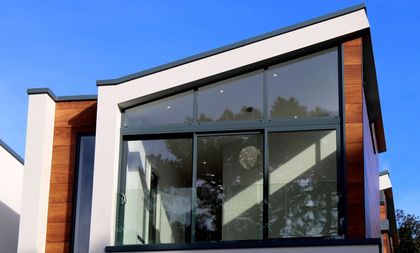Why Residential Window Tint is a Smart Investment for Homeowners
Why Residential Window Tint is a Smart Investment for Homeowners
Blog Article
Exactly How Residential Window Tinting Enhances Your Home's Energy Effectiveness
Residential home window tinting offers a compelling remedy for property owners looking for to boost power effectiveness within their living rooms. By applying specialized movies to windows, it properly decreases heat transfer, therefore stabilizing interior temperatures and lessening the need for extreme heating or cooling.
Understanding Home Window Tinting
Comprehending window tinting is essential for homeowners seeking to improve both comfort and energy performance in their home. Residential Window Tint. Window tinting involves the application of a slim film to the interior or outside surface area of glass home windows. This film can significantly modulate the amount of sunshine and heat that gets in a home, therefore influencing interior climate problems
There are various types of window tinting films readily available, each with distinctive homes. The effectiveness of window tinting is frequently measured by its Visible Light Transmission (VLT) portion, which indicates how much light can pass through the film.
Benefits of Power Efficiency
Home window tinting not just boosts appearances yet additionally plays a considerable role in enhancing power effectiveness within residential rooms. By lowering warmth transfer via windows, colored movies produce an extra stable indoor environment, which can lead to considerable reductions in power intake for cooling and heating. This power efficiency equates right into lower utility costs, providing house owners with significant long-lasting cost savings.

In addition, home window tinting enhances the convenience of living spaces. By reducing glow and obstructing hazardous UV rays, colored home windows develop a more pleasurable environment, which can bring about enhanced well-being for owners. The security versus UV rays likewise helps maintain furniture and floor covering from fading, adding to the long life of home things.
Exactly How Tinting Works
Tinting films run with a mix of sophisticated materials and modern technologies created to manage the amount of solar power getting in a home. Mainly made up of polyester, these films frequently include ceramic or metal particles that absorb and show warmth. This double capacity enables them to significantly minimize the infiltration of ultraviolet (UV) rays and infrared radiation while permitting visible light to travel through.
The effectiveness of window tinting is gauged by its solar heat gain coefficient (SHGC), which suggests just how much solar power is transmitted with the home window. Lower SHGC values are more effective as they represent greater warm denial. In addition, window tints can include a selection of tones, allowing property owners to personalize their visual choices while boosting energy efficiency.
Moreover, these movies work as a barrier, avoiding warm loss during chillier months by showing indoor heat back right into the living room. This thermal insulation effect complements the cooling benefits gained during warmer months, contributing to a balanced indoor climate year-round. By managing solar power efficiently, domestic window tinting not only enhances comfort but also plays a crucial duty in minimizing power usage and reducing utility bills.
Selecting the Right Tint

There are numerous types of window films offered, consisting of colored, official source metalized, and ceramic. Ceramic movies give excellent heat control without jeopardizing exposure and are extremely long lasting, making them a preferred selection.
Noticeable light transmission (VLT) is an additional crucial element, as it suggests the amount of natural light that can travel through the tinted glass. Property owners must choose a tint with a VLT that matches their illumination preferences while still offering sufficient glare reduction.
Additionally, evaluating the solar heat gain coefficient (SHGC) can help determine just how well a color can obstruct warm from sunlight. A lower SHGC shows far better warm control, eventually improving power performance.
Installation and Upkeep Tips
Appropriate installation and upkeep are crucial elements in taking full advantage of the benefits of household home window tinting. To achieve optimal results, it is advisable to work with a qualified specialist for setup. This makes certain that the tint is applied correctly, staying clear of air bubbles, wrinkles, or imbalance that could endanger performance. Specialists also make use of specialized tools and strategies, which can enhance the durability and efficiency of the color.
Complying with setup, upkeep is crucial to lengthen the life of the home window film. It is advised to wait at the very least 30 days prior to cleansing the tinted windows to allow the adhesive to Find Out More cure fully.
Attending to these problems quickly can avoid further damages and preserve energy performance. By sticking to these setup and maintenance pointers, house owners can ensure their window tinting proceeds to offer significant power cost savings and comfort for years to come.
Verdict
To conclude, domestic window tinting works as an effective solution for improving energy performance within homes. By decreasing heat transfer and obstructing damaging UV rays, home window films contribute to reduce energy intake and improved interior comfort. The option of suitable tinting products, together with correct setup and upkeep, even more takes full advantage of these benefits. Eventually, home window tinting represents a lasting investment that not just lowers site here energy bills yet also advertises a comfy living atmosphere throughout the year.
Window tinting includes the application of a slim film to the inside or outside surface of glass home windows. By decreasing warm transfer via home windows, colored films produce an extra stable indoor climate, which can lead to substantial decreases in power consumption for heating and cooling.The efficiency of home window tinting is gauged by its solar warmth gain coefficient (SHGC), which indicates how much solar energy is transmitted with the window. By handling solar power properly, residential window tinting not only enhances comfort however likewise plays a crucial function in minimizing power usage and decreasing energy expenses.
By minimizing warm transfer and obstructing dangerous UV rays, home window movies contribute to reduce energy consumption and improved indoor convenience.
Report this page